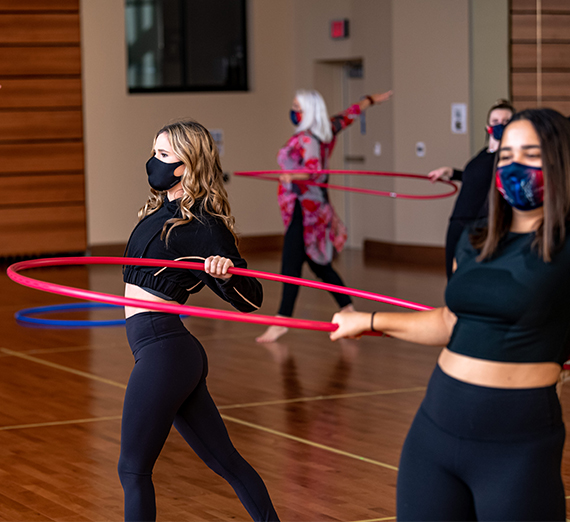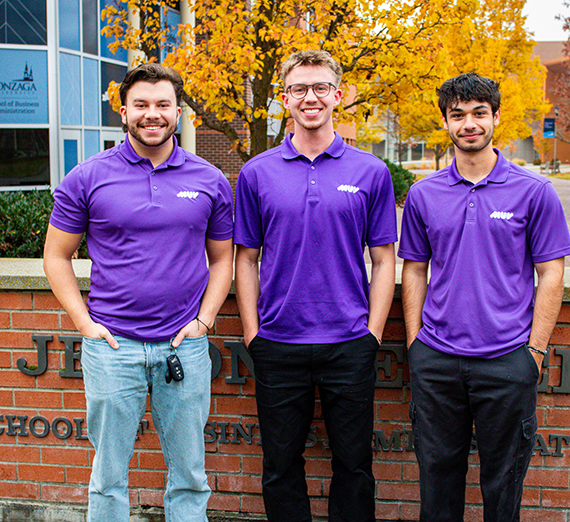Students' Ideas for a Better Pandemic Experience

As a health educator in the Office of Health Promotion, part of Katie Noble’s job is educating others about mental health, and advocating for resources for students to help them navigate their challenges.
But in 2020, her job is much broader, normalizing the anxieties brought on by emotional challenges, disconnection with peers and family, screen fatigue and isolation that many of us are facing during the pandemic.
On Oct. 30, she conducted a public virtual conversation with a panel of six students, who spoke about their class and interpersonal experiences. Noble outlined these key takeaways, in hope that it inspires empathy for what our students are experiencing, and offers a look into how me might best care for students.
Watch the full recording here. Listed below are some of the major themes and take-a-ways from this 50-minute session:
• Significant amounts of screen time. Students shared that they are spending between 8-10 hours per day on their computers whether doing homework, in meetings, synchronously in class via Zoom, or asynchronously watching videos or other materials for their courses. Students noted that they feel that they have more classwork and time dedicated towards classes compared to pre-pandemic courses.
• Major disruptions to life and school schedule. Several students had changes to their schedules, are no longer studying abroad, and/or are creating shifts to their course schedules and plan based off whether courses were offered in person, via Zoom, or hybrid. Significant impact on social connections with friends, family, professors, and classmates. Students are still living with uncertainty.
• Creating a balance between school and life is hard to navigate. Panelists shared various experiences about how their physical environments have changed and the difficulty of creating and maintaining their social and support networks.
• Communication and Gonzaga’s Response to the Pandemic. Most undergrads agreed that the response has been good or great. They would prefer an excess of information compared to not enough information. Our law school panelist shared that they felt the response to law students has not been as supportive or responsive to their needs.
• What do you want staff and faculty to know as we move into the second half of the semester and think ahead to the spring?
- Participation via Zoom is difficult, especially for introverted students. Consider using Zoom tools such as the chat feature, polls, or breakout rooms to encourage engagement and participation.(Hosts/professors can visit the rooms to hear conversations.)
- Breakout rooms can help build connection amongst students in a smaller setting.
- Consider ways to decrease screen time or use of electronics (e.g., audio recordings).
- Reflect on ways to build meaningful connection with your students. Panelists noted doing a quick check in survey or reminding students to connect with you via office hours for quick 1:1s is helpful. Remind students when and how you’re available to them.
- Normalize the struggle for students, staff, and faculty. Talk openly with your students about how they’re doing and try to adapt and be flexible. Many students may be struggling but they also recognize that faculty and staff may be struggling as well. Create space for students to feel comfortable talking about their challenges and consider how you may open up about your challenges.
• Students feel they have the academic support needed to be successful.
• Mental Health and/or Self-Care Day(s). Students advocated for self-care breaks or mental health days. Consider multiple days or shortening a few class periods and encourage students to use the time for self-care. As we move to next semester, consider what this may look like within your course knowing you and your students will not receive a spring break to recharge.
• Students are sad and frustrated with no Spring Break but they understand why. Consider a lighter week during that time, if possible.
• Positive effects of the pandemic: more intentional and better connection with close friends and family, developing skills around maintaining and fostering relationships, and more appreciative of their health and well-being.
Student campus resources are available at Student Resources. For staff and faculty members needing additional support, contact Human Resources.
- Academics
- Health & Wellness
- Student Life




